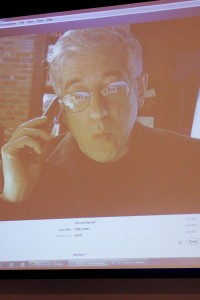Panel focuses on dangers of the 2014 Winter Olympics
On Thursday afternoon, USC students and faculty gathered to hear Leon Aron, resident scholar and director of Russian studies at the American Enterprise Institute, discuss the political, security and climate problems surrounding the Winter Olympics during a talk entitled “Sochi 2014: The Most Dangerous Olympics in History?”

Skype’n in · American Enterprise Institute director of Russian studies Leon Aron spoke on his worries about the Sochi Olympics via Skype. – Macaul Hodge | Daily Trojan
The American Enterprise Institute is a think tank which many consider to be conservative.
“The list of things that could go wrong is huge, especially for the Winter Olympics,” Aron said.
Aron, who spoke via Skype from Washington D.C., pointed out that every year the Olympics is plagued by four distinct risks: weather, public protests, venue malfunctions and terrorism.
“Each of these four factors has been magnified in Sochi,” he said.
Aron said that Sochi is one of the warmest places in Russia. He mentioned that sports events have been canceled in this area in previous years due to rain and weather constraints. Aron said the “slushy” snow conditions provided by Sochi could cause a higher number of Olympic injuries to participants than usual.
“Putting your Olympics in the subtropics is clearly one [danger],” Aron said. “It’s the doubling of the poker bet.”
Aron also addressed the possibility of structural issues and construction defects due to Russia’s labor conditions and the “mad rush to finish” on time for the games.
“I’m willing to bet that there has not been a Winter Olympics game in history where the gap between what was there and what was needed was so huge,” he said.
In preparation for the games, Aron said that Sochi built a new airport, seaport, 70 bridges, 12 tunnels and hundreds of miles of roads and railroad tracks.
“Hence the enormous price tag,” Aron said. “It’s estimated that it cost over $50 billion.”
Due to political corruption and negative labor conditions, Aron believes that many of the new buildings might not be structurally safe.
“So far, thank God, nothing collapsed, nothing happened,” he said. “However, we shall see.”
Aron also mentioned the danger of public protests that turn violent. He identified two groups — LGBT and Circassians — as potential protestors. He said, however, that not many protests have happened so far because of the permits required to get close to the games.
“But, perhaps the greatest gamble that [Russian President Vladimir] Putin took is the gamble of terrorism,” Aron said.
“Sochi is not only the warmest place in Russia, it’s literally over the mountain from the most dangerous zone in Russia, actually the fourth most dangerous place in the world … [for] terrorism,” Aron said.
Aron noted the current bombings and terrorist actions that are currently taking place in response to this topic as proof for the danger Sochi poses to the Olympic Games. He also added that he believes Putin chose a location so close to the dangers of terrorism to show Russia’s strength.
“To him, putting the Olympics next door to the troubles north [of the] Caucasian area, to the center of terrorism, was very important, because that signified his personal triumph,” Aron said. “As it turned out, de facto, he did not succeed because there is increasing terrorist activity there.”
Throughout his speech, Aron underlined the role that the Russian president and Russian autocrats had in placing the 2014 Winter Olympics in Sochi.
“Make no mistakes about this,” Aron said. “There is only one person who makes decisions of this scale in Russia. And that is the president.”
Kyron Jacques, a sophomore majoring in public relations, thought that Aron brought up thought-provoking political points about the Olympics that many media outlets ignore.
“It will be interesting to see what Russia and Putin’s reputations are after the games, and if something does happen, what it will mean for future games,” he said.
The event was sponsored by the American Enterprise Institute at USC and the USC Russian Culture Club.
Aron is the author of three books, and more than 300 articles and essays. He has been a contributing writer for The New York Times and The Washington Post and researches U.S. and Russian relations, Russian foreign policy and Russia in the post-Soviet era.

